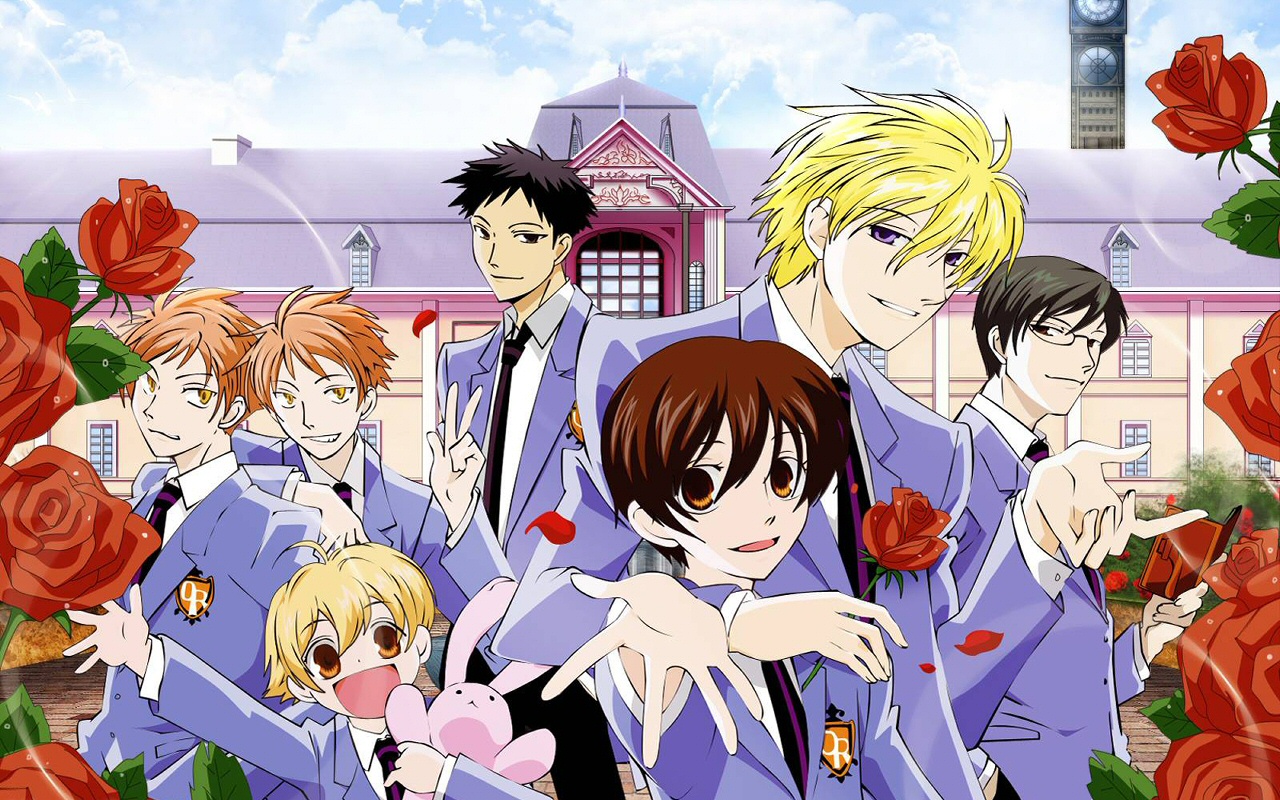How obnoxious is it to return to your apartment and find your roommate sprawled on the sofa, spreading chocolate chip cookie dough all over the floor, and, perhaps worst of all, watching a television show on your flat screen television where young people oogle with each other on a bed of roses while speaking a foreign language?
I did that almost every Friday night last semester, so here is my opportunity to apologize to my roommates. Sorry. Please do not judge me.
The anime I was watching while performing said obnoxious activities was called Ouran High School Host Club, produced in 2006 and available on Netflix and on YouTube, which features an ensemble of students who decide to open a host club as their extracurricular activity. For the record, extracurricular activities such as baseball or table tennis consume the entirety of a Japanese high schooler’s after-school and summer lives (the Japanese term is bukatsu, or club life). Host clubs are a form of late-night entertainment, where, for a sum of money, a young host flirts and drinks with a client of the opposite sex.
If you’ve never watched Ouran, the title alone is probably enough to discourage you from ever watching the anime. Many Halftime readers will, I postulate, skip reading this article because of the very rosy and cartoonish featured image that I have instructed this site’s editors to upload. While many of my fellow anime fans know of Ouran, some of them have refused to watch it because they find the flowers and the boy-girl oodling unpalatable.
Indeed, almost every episode of the anime begins with a dramatic scene where the tall double doors to the host club open, and Tamaki Suoh, the club’s ringleader, stands front and center with the ensemble of male hosts ready to serve the giggling female guests. In his characteristically dramatic voice, he introduces the club’s lavish theme of the day, whether a Japanese garden tea party, a French noble gathering, or an Arabian palace. The comparisons to the average soppy romance drama, however, end there.
After sitting through the first few episodes of Ouran, though, you will realize that the eccentric character drama is not as one-dimensional and straightforward as it appears. Mitsukuni Haninozuka, a tiny blonde boy, is Honey-senpai (the name suffix senpai being a term used to describe the elders of a certain social group). A purveyor of candy, cake, and stuffed animals, you would expect him to be an adorable little teddy bear. But Honey-senpai can be one scary monster, quite literally.
Even the self-assured leader of the whole enterprise, Tamaki, isn’t that much of a king, or a prince, as the characters of his family name in Japanese (須王, necessary king) would imply. He holds absolutely no control of his club’s direction or finances, resorting to giving his subordinates puppy eyes when he wants to act on an initiative.
At the pinnacle of this more-than-meets-the-eye theme, for lack of a better adjective, is the show’s protagonist. Haruhi Fujioka is a scholarship student who lives in an apartment and comes from an ordinary family rather than a European mansion like the rest of the cast. He is forced to become a host in the first episode (and hence the reason for why this anime’s story exists) after stumbling into the host club’s room and accidentally knocking over a vase worth 8 million yen. Yet, the club’s members fail to realize that she is actually female. When they do, they actively hide that fact, and Haruhi continues to appear with cropped hair, blazers, and pants.
Haruhi becomes a source of eternal disruption to the club—and, indeed, to our preconceived perceptions of the anime and the baggage of stereotypes it brings along. It is through her presence in the club that she fleshes out the sophistication and vulnerabilities in the rambunctious members of the host club, to the point where Tamaki wants to leave Japan for France and disband the host club.
My personal favorite is Haruhi’s effects on Hikaru and Kaoru Hitachiin, two identical twin brothers who perform rituals of incestual love to shock and charm their paying customers. They thrive on the fact that nobody has been able to tell them apart, and nobody has ever won their “Which one is Hikaru?” game. As a result, they are practically the same person, saying the same things in tandem and finishing each others’ sentences. But that comes at a cost of social isolation. They refuse to form meaningful connections with others, and look to people who fail to win their seemingly unwinnable game with disinterest and disdain.
Their facade begins to crack when Haruhi, in an instant, is able to confidently discern who is who simply by the tone of their speech (which is actually really hard; I’ve never bothered trying for myself). The twins deny it at first, but they find immense trouble accepting that someone has actually won their “Which one is Hikaru?” game. Almost immediately, the twins stop speaking in tandem with one another and begin their emphasize their differences; a ridiculous fight ensues between the two of them that lasts for the rest of the fifth episode.
Haruhi’s arrival to the club brings irreversible consequences to the two brothers. For the first time in their lives, Hikaru and Kaoru must deal with difference, with people beyond their self-protective bubble, and with each other. When both of them simultaneously develop feelings for Haruhi, both begin to confront the fact that they are, in fact, two separate beings. You know that the show is driving to drive a point home when Hikaru appears by himself, without his twin, on an arranged date out with Haruhi where he finally begins to develop some semblance of compassion for other human souls. Haruhi will come to rock the Hitachiin Brothers’ boat perhaps a little strongly, but they both, in my opinion, mature to become two of the most adorable characters in the series. We must never be complacent about who we are, or what our friends (or partners) can do for us.
By the end of the anime, I was wondering how I could pitch Ouran to my friends without being laughed at for watching an unsophisticated romantic comedy with exaggerated stereotypes. If we all carried preconceived notions and judgments of Ouran without bothering to see for ourselves the show’s sharp satire for a particular type of popular Japanese fiction and amazing character development, how will we ever begin to enjoy it? And if we all carried preconceived notions and judgments of anime as an eccentric subgenre of animation that only a small subsection of the population that devoutly loves comics and action figures, how will we ever begin to enjoy anime?
Photo: comicsonline.com





